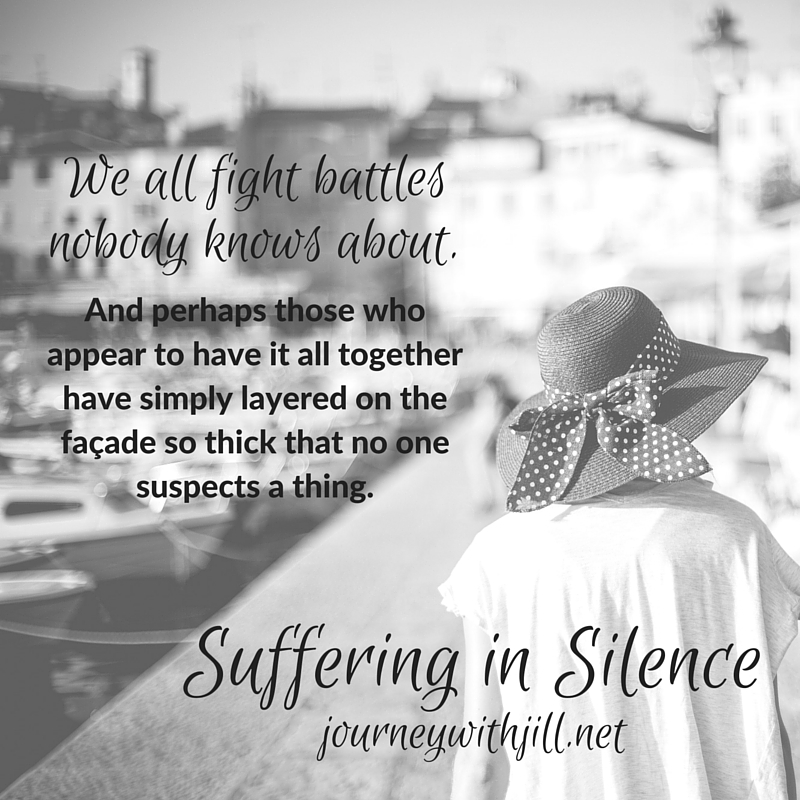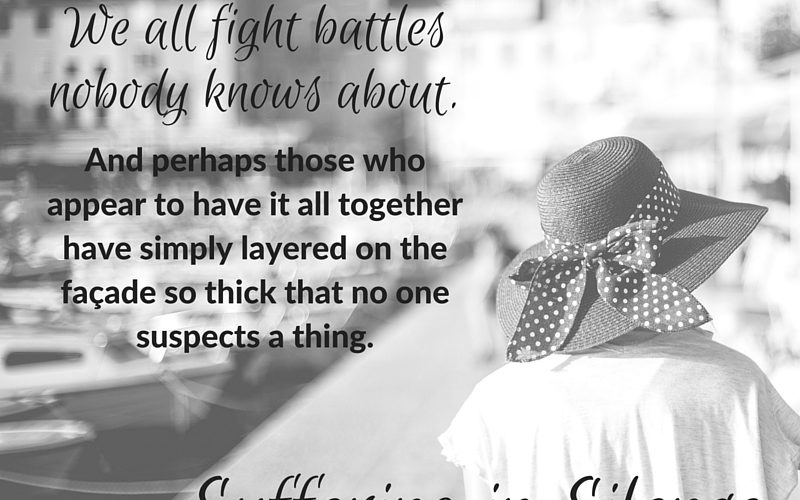“Do you have enough calories left to go to La Huerta tonight?” my dad chuckled. I laughed. “I’m not sure.”
The week before, I had downloaded an app called My Fitness Pal to shed a few pounds I had put on over the winter. My clothes were fitting tighter, I felt out of control, and I knew I needed to make better choices for my health.
This being the first time I’ve ever seriously dieted (losing 10 pounds by eliminating cookies and Kool-aid in my 20s doesn’t count), I had only told a few people, all but one being my immediate family.
If you read my blog you know I’m pretty much an open book, but this part of myself I keep very private. After all, I appear to be at a healthy weight and perhaps you just rolled your eyes inside when you read the first two paragraphs. The skinny girl wants to lose weight. I know, I know.
This is the very reason I’ve struggled in silence my whole life about my body image.
I’m not even sure when it started. Was it when I subscribed to Teen magazine as a middle-schooler and began religiously working out to Denise Austin as an 11-year-old?
Was it when, as a teenager, I noticed my body attracted guys’ attention, and because of my low self-esteem, I settled for this imposter form of acceptance?
Was it when I had gained some weight after I got married, and the nurse at my yearly exam read me my weight with a “tsk, tsk” all those years ago? (Even now, as I look at the scale, I make myself feel better by saying, “well at least I’m not at that number,” as her voice still echoes in my head.)
Or is the fact that I can recall each of these instances with such detail, proof that it’s a combination of them all?
Regardless of when my struggles began, I know this very real battle that caused me to try to purge my food as a 5’6″ 125-lb. teenager — thankfully I didn’t succeed — has followed me into adulthood.
Yet until now, I’ve never shared it.
So why now?
I’m convinced more than ever, many of us suffer in silence. We fight battles nobody knows about. And perhaps those of us who may appear to have it all together have simply layered on the façade so thick that no one suspects a thing.

So, the person you’re secretly jealous of because she seems to have it all together, possibly fights a battle so deep and so buried, you couldn’t guess it if you tried.
Why do we take such pains to hide our deepest scars? With the buzzwords of today being “vulnerability,” “transparency,” and “authenticity,” you’d think we’d all open up, right?
I’m not sure about anyone else, but the main reason I’ve hidden my body image battle is I don’t want to appear to minimize someone else’s more significant struggle. There are those who would love to only need to shed a few pounds. There are those who did succeed in purging — or depriving themselves of food — as teenagers or young adults. My battle doesn’t compare. I know that. So I hide it.
I just wonder about others. The stay at home mom who is crippled by loneliness but she doesn’t tell anyone because she should be grateful she can be home with her children all day.
The wife whose husband belittles her at home but who provides generously for her every need.
The working mom who desperately misses her children all day but whose financial security is the envy of so many.
The woman whose Facebook feed portrays a socialite with little need for friends, yet who can’t name a single one with whom she feels comfortable sharing her deepest feelings. But she hides her pain because on the outside, it appears she has all the friends she needs.
How many around us, with whom we come in contact every day, are suffering in silence? How many don’t dare share their struggles for one reason or another? How many people do we envy what we see on the outside but don’t understand what goes on away from the public eye?
Not all pain is obvious; in fact, I feel that the deeper the pain the more well-hidden it remains.
So what are we to do?
Be the first to risk vulnerability.
Of the years I’ve been blogging, my most personal, raw posts are always the ones that get more comments of appreciation for my honesty. I have to be honest, though. For some of us, it’s easier to be open behind a screen, whether that’s through writing or blogging or social media. But allowing myself to be raw in person is an entirely different story.
Yes, there’s risk to share. But there’s a greater risk not to share. You see, the person you’re talking to may have a deep pain hidden from everyone, and all she needs is someone to be real with her, to open the door for her to feel comfortable sharing her own struggles.
In a sense, sharing our vulnerabilities to someone we trust is loving them.
Listen to what’s said…and what’s not being said.
So often I find myself in conversations, even while I’m listening, thinking of myself. What I’m going to say next. How I can relate an experience to what’s being said. As I’ve practiced keeping my focus on the other person, asking questions, keeping my comments focused on them, not rushing to reply, I’ve noticed the other person more willing to continue talking, sharing, viewing me as a safe place.
Also by keeping the focus on the other person, I can detect cues to what’s not being said, giving me understanding and insight. From there I can, again, ask more caring questions — not as an interrogator — but as a concerned friend.
We worry that we’re intruding. But I’ve found that people sometimes just want to be asked. They want to know that we are willing to step into their mess with them.
Don’t make assumptions.
Just because someone seems fine, this doesn’t mean she is. Approach every relationship, every conversation, with the understanding that all may not be what it appears. Be full of kindness and compassion, for you don’t know what battles are going on undetected.
This is especially true for those who rub you the wrong way. If, for example, they put you off with an air of self-righteousness, it’s possible they’re fighting against the impossible battle of perfectionism and insecurity.
Grab some coffee.
Because coffee makes everything better. (Just kidding…sort of.)
Our social media-driven world has created a false sense of connectedness. Sure, a text or email is better than nothing. But make the effort to have face to face conversations with those God has placed in your path — in your care.
So much of our communication is body language, which is impossible to decipher from the screen. Be intentional about your relationships. If you detect the slightest hint that a friend is suffering, make plans to be together. The conversation may or may not go deeper than the surface, and that’s okay. Sometimes establishing yourself as a safe place and helping someone trust you enough to talk about painful things takes time.
I’m convinced there is an enormous untapped potential in our relationships. By understanding that so many of us suffer in silence, we are taking the first step to giving and receiving the authentic love that Jesus called His people to model. And this love is so extraordinary, so counter-cultural, it’s only natural for the world to crave it. Let’s, as God’s people, take the first steps to love those suffering in silence.
Do you ever find yourself suffering in silence because you’re afraid of what others may think of you?


Every time I read your posts, Jill, I’m blown away by the gift God has given you! You write beautifully and I’m always blessed. Today’s particular post strikes close to my heart. I’m gifted at wearing masks, unfortunately. It’s easier some times, than to get all muddy with what really lies beneath. Thank you for your courage in sharing.
Thank you, Beverly, your words are touching. I’m glad this post encouraged you.